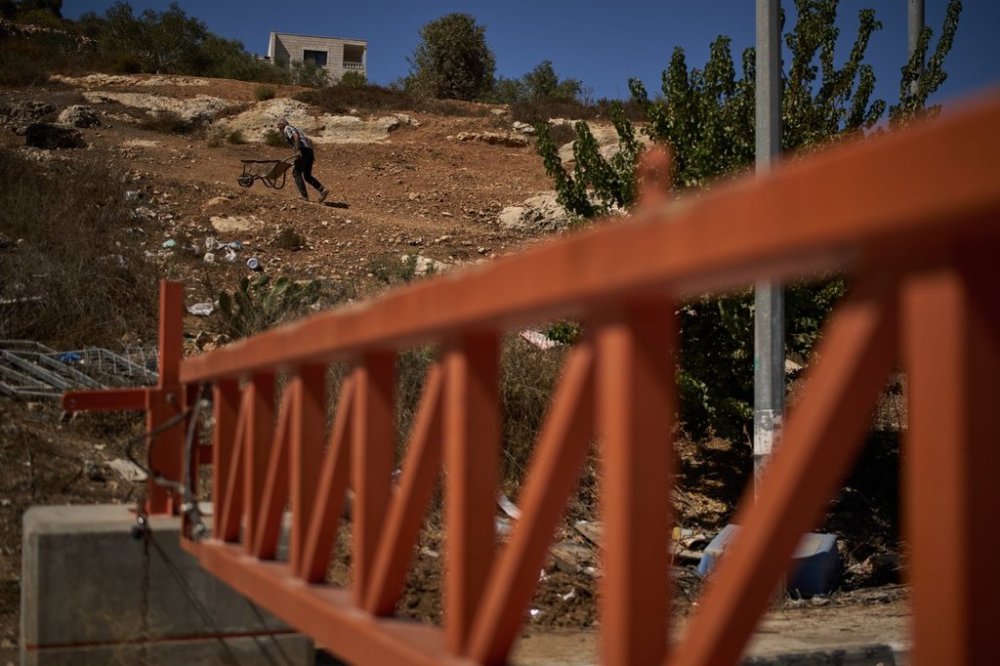Israel has erected nearly 1,000 barriers in the West Bank during the war in Gaza, group says
Advertisement
Read this article for free:
or
Already have an account? Log in here »
To continue reading, please subscribe:
Monthly Digital Subscription
$0 for the first 4 weeks*
- Enjoy unlimited reading on winnipegfreepress.com
- Read the E-Edition, our digital replica newspaper
- Access News Break, our award-winning app
- Play interactive puzzles
*No charge for 4 weeks then price increases to the regular rate of $19.00 plus GST every four weeks. Offer available to new and qualified returning subscribers only. Cancel any time.
Monthly Digital Subscription
$4.75/week*
- Enjoy unlimited reading on winnipegfreepress.com
- Read the E-Edition, our digital replica newspaper
- Access News Break, our award-winning app
- Play interactive puzzles
*Billed as $19 plus GST every four weeks. Cancel any time.
To continue reading, please subscribe:
Add Free Press access to your Brandon Sun subscription for only an additional
$1 for the first 4 weeks*
*Your next subscription payment will increase by $1.00 and you will be charged $16.99 plus GST for four weeks. After four weeks, your payment will increase to $23.99 plus GST every four weeks.
Read unlimited articles for free today:
or
Already have an account? Log in here »
SINJIL, West Bank (AP) — Since Israel ‘s war with Hamas began more than two years ago, Israel has erected nearly 1,000 barriers in cities and towns in the occupied West Bank, further stifling movement for Palestinians and hindering daily lives, a local government body says.
While Israel’s military has long imposed movement and access constraints after capturing the West Bank in the 1967 Mideast war, the number of new barriers is unprecedented, residents say.
According to the Wall and Settlement Resistance Commission, an official Palestinian governmental body, 916 gates, barriers and walls have been installed since the Oct. 7, 2023, Hamas-led attack on Israel.

Israeli military raids throughout the West Bank have also increased, with Palestinians killed or detained. Israel says it is trying to root out militancy.
Among the new barriers are metal gates stationed at many village and town entrances and between cities, blocking access in and out. Sometimes the Israeli military is stationed at them.
Palestinians say the gates have erratic opening hours, with some staying shut for days. Some people sleep at friends’ or relatives’ homes or go around the gates on foot.
During the first two weeks of September, the United Nations said it documented the installation of 18 gates in the West Bank. It said the gates and other obstacles, such as large earth mounds and concrete blocks, restrict Palestinians’ freedom of movement and access to healthcare and education. The barriers are placed in the middle of roads, preventing cars from going around them.
The new gates, some of which block roads connecting the northern and southern West Bank, force the territory’s 3 million Palestinians to take long detours, with a 20-minute journey now taking more than an hour.
Israel’s military says the gates are not meant to restrict people but rather to “manage and monitor.”
A military official, speaking on condition of anonymity in line with regulations, said its forces operate under a “complex security reality” in the West Bank, where militants embed themselves within the population and “accordingly, there are dynamic checkpoints and ongoing efforts to monitor movement in various areas.”
Residents say some gates have been equipped with cameras.
They also say the barriers have detrimental effects on their lives.
“Under the current circumstances, everything has been cut off. Everything has stopped,” said Ezzedine Al-Sayouri from Deir Dibwan village. The gates have prevented people from coming to his gym and he’s considering closing the business and leaving the country, he said.
Residents in the village of Aboud say the entry gates there are closed between 6 a.m. and 9 a.m. every day, preventing students from going to university and people from going to work.
It’s all part of the “occupation’s strategy to destabilize the people’s sense of security,” said Mohammad Shalatweh, a taxi driver.
Others worry that the added barriers are a security risk.
Eyad Jameel, a restaurant owner in the village of Sinjil, said every time his son goes to the main city of Ramallah he’s not sure he’ll return.
“They don’t always open them, they just close them and trap everyone,” he said.

